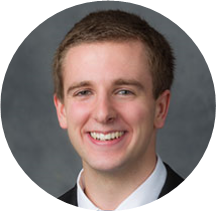Deacon Spotlight: Peyton Barr
Peyton Barr (2015 BA in Politics & International Affairs and Russian)
Legal Assistant for Corporate and International Counsel at Revlon in New York, NY
Tell us about your current job role and what you’re working on.

I support the corporate governance of Revlon, Inc. and its dozens of domestic and international subsidiaries. This includes preparing materials and agendas for Board of Directors meetings, reviewing financial and legal documents for international subsidiaries and facilitating corporate projects. Some of my larger projects have been due diligence collection and dissemination during an acquisition and drafting BoD materials related to executive compensation.
What was the most challenging aspect of your first “real world job” and what did you learn from it?
Learning how to manage interpersonal and hierarchical conflict was challenging. As students at Wake, we were often times encouraged to challenge professors and administrators with differing viewpoints. Some professional and quantitative environments differ strongly, valuing service and consistency over initiative and originality. I’ve also learned that these institutional values change across industries, companies and ranks, and that identifying office culture should be a valuable element of the job search.
What advice would you give to new Wake Forest graduates about developing their personal life habits after college?
There is no curriculum outside college, so you may experience a “void of purpose” and often times, a void of community. If you’re seeking purpose or community outside of work, look to your hobbies and passions such as volunteering at your favorite non-profit or sports/exercise team activities. As far as “real world responsibilities”, I’ll share a gem from one of my WFU mentors: minimize your administration time. Manage your finances with automatic funding features, make email folders for your tax and financial liabilities and balance your budget.
Have you been mentored by anyone at Wake Forest or in your professional life? If so, what impact has that relationship had on you?
Absolutely! As a Fellow, I was mentored by faculty in the OPCD and my major departments who were interested in my personal development. They helped me to discern my career path and combine happiness and success. My professional mentors after Wake are resources for more technical career advancement, including explaining best practices for constructing a particular presentation, document, or argument. This doesn’t totally discount the existence of personal mentoring after college, but these relationships take time to flourish. Ideally, you need both styles for rewarding mentoring.
What are your future career goals or plans? How are you being intentional about working towards them?
I set deadlines to accomplish extracurricular and career-related tasks. As students we’re all used to deadlines, so create some for yourself and keep yourself accountable. Whether its finishing a book, applying for a job or participating in a fitness challenge, managing your time helps manage the results.
What advice would you give to current Wake Forest students and/or young alumni who are about to start their first professional job?
Volunteer for special projects and anything you can get your hands on. You’ll only learn more (and be more marketable down the road) if you constantly challenge yourself and living outside your comfort zone. In short, comfort can be a recipe for mediocrity and staleness so challenge yourself and make bold moves.
Story published in April 2017. For current updates about Peyton, visit his LinkedIn page.
